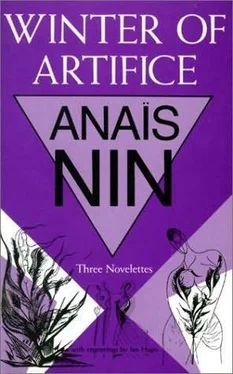Anaïs Nin - The Winter of Artifice
Здесь есть возможность читать онлайн «Anaïs Nin - The Winter of Artifice» весь текст электронной книги совершенно бесплатно (целиком полную версию без сокращений). В некоторых случаях можно слушать аудио, скачать через торрент в формате fb2 и присутствует краткое содержание. Год выпуска: 2007, Издательство: Sky Blue Press, Жанр: Классическая проза, на английском языке. Описание произведения, (предисловие) а так же отзывы посетителей доступны на портале библиотеки ЛибКат.
- Название:The Winter of Artifice
- Автор:
- Издательство:Sky Blue Press
- Жанр:
- Год:2007
- ISBN:нет данных
- Рейтинг книги:4 / 5. Голосов: 1
-
Избранное:Добавить в избранное
- Отзывы:
-
Ваша оценка:
- 80
- 1
- 2
- 3
- 4
- 5
The Winter of Artifice: краткое содержание, описание и аннотация
Предлагаем к чтению аннотацию, описание, краткое содержание или предисловие (зависит от того, что написал сам автор книги «The Winter of Artifice»). Если вы не нашли необходимую информацию о книге — напишите в комментариях, мы постараемся отыскать её.
“A handful of perfectly fold fables, and prose which is so daringly elaborate, so accurately timed… using words as magnificently colorful, evocative and imagist as any plastic combination on canvas but as mysteriously idiosyncratic as any abstract.”
—
The Winter of Artifice — читать онлайн бесплатно полную книгу (весь текст) целиком
Ниже представлен текст книги, разбитый по страницам. Система сохранения места последней прочитанной страницы, позволяет с удобством читать онлайн бесплатно книгу «The Winter of Artifice», без необходимости каждый раз заново искать на чём Вы остановились. Поставьте закладку, и сможете в любой момент перейти на страницу, на которой закончили чтение.
Интервал:
Закладка:
There came the woman so round and full-fleshed, like the mother. So large and full, the Rubens woman, with enourmous breasts. But it was not her mother. She loved her breasts and caressed them. As she caressed the woman she felt her masculinity. She asked: “Why didn’t you tell me this before?” The woman answered: “I thought perhaps you would not like it.” No, it was true, she did not like it, she turned away. But the Rubens woman came back in another form. She was not deluded, she knew it was always the same woman. She was the whore, the woman animal, the lioness. She came back as a heavy luxuriant goddess, too, the goddess of abundance. Her flesh was down, a bed of sensuality, every pore and curve of her. She was the immense statue, the oldest of all the whores, with her mask of avidity. Her hands were grasping, her flesh throbbing in a mountainous heaving way, without electric sparks, rolling, fermenting, saturated with moisture, folded in many lapping layers of voluptuous inertia. Her flesh was without eyes, without antennae. It was without ears, without nerves, without currents. It was a bed of flesh, burning without fire, trembling only from caresses and then dying again. Dead when not touched; like layers of silk, tempting the hands. A river bed of engluing moss, of adhesive rubber plants. Perspiring milk from the heavy flow of desires, the moist currents flowing into the canals of her prone body; all the fluid currents of desire seeping along the silver bark of her legs, around the violin-shaped hips, descending and ascending with a sound of wet silk around the cones and crater edges of her breast. Flesh mother, the oldest of all the whores, who on dark nights of punishment took Hans away from her and left her weeping. She the whore and goddess of earth, whom on other nights Djuna destroyed with lightning, standing like an idol covered with splendor, breathing out a fire which turned the woman into a crumpled heap, like a dead animal. But the woman reappeared. She reappeared in the sparkling costume of the burlesque queens, she came dressed in the tight skirt of the street walker, always preying and waiting. And Djuna did not always hate her; she loved her heavy, obscene walk, her navel glance, her animal passivity, her spreading herself at a café table like a seal, her drunken sullenness. Djuna wanted to enter the woman in her, and be lost in her too, like the feelings of man when he entered and lay in her. She was inside the whore feeling the entrance of man, aware of her feeling, the woman’s feelings and the man’s feelings.
Djuna wanted to kill the Rubens woman. She prepared a bath for her with a strong acid. She said to her: “Let’s take a bath together.” The Rubens woman slapped her when she was naked, laughing. Djuna covered her own body with wax so that the acid would not touch her. She said to the Rubens woman: “This bath comes from Egypt.” The Rubens woman began to dissolve, still laughing. She dissolved completely. The bath was full of jellied substance. She touched it. It was like Jello which she did not like to eat as a child. She felt she must conceal this somewhere. She dug a deep hole in the earth. She filled the hole with the acid. It took her a long time; the hole seemed to get deeper and the jelly more and more abundant. She was so tired she fell asleep. When she awakened it was daytime and the jelly had all come to the surface again. The Voice was looking at the spectacle with his eye glasses shaking. His little hands rubbing together, and his voice unsteadily saying: “Everything is a symbol. The poet is the one who calls death an aurora borealis.”
While the concert was going on the Voice sat at the back of the box and showed only the refracted light on the rim of his glasses. Georgia, in her long black dress, looked like Rasputin. Her heavy hair straight and long, her two black arms, the chaste black monk gown, agitating herself over the instruments, projecting her strength into them.
Lilith sat below, but not lost among the other faces. Watched by the searchlight of the Voice’s glasses, her face, very white, was open to the music and her restlessness was for a moment suspended. When Mischa came out she thrust herself forward as if she wanted to envelope him in her own strength.
Lilith had gone backstage before the concert.
Georgia had fixed her with her wolf eyes and said: “I am playing for you. ” So Lilith felt as if the concert were coming from her. And the Voice had told Georgia: “You will conduct well,” as if it were an order. So the Voice felt the concert was his creation; he was leading, he was the strength of it, in it, directing. And the music had been ordained to transmit the currents of his desire across the space to a Lilith on fire with desires. Mischa was giving a silver icy chant which Lilith accepted as an expression of her disenchantment. All the disenchantments—the Voice stepping out and metamorphosed into a man such as she had seen by the million all around her, less than all, a non-face, a non-body, a non-presence, a vanishing of his force, all the light gone out of him as soon as he stepped out of his mysterious Voice role; in the daylight his skin the color of death, his eyes the blurredness of death, his words the dullness of death. Music carrying in its immense waves a foam crest of delusions, in its falling, running, spilling downfall a moment of suffocation, in its undertows waiting for the moment of despair to engulf one. Lilith falling over with a vertigo of despair, struck in the center of her being by the constantly inaccurate shafts of sex—never thrusting her for life but bleeding her, mereaccuounds.
Georgia would pursue her, panting, having sensed in Lilith the response—and not the ultimate non-response. Throughout the multitude of identical rooms Lilith could see men and women embracing convulsively. The same images—but resonances of all kinds, as varied in power as this music now swelling and dying in plaits of sand combed with silver combs. All the little rooms alike and Djuna lying swathed in the fumes of her dreams from which she would never awaken, wanting only the scenes which resembled the dream and skipping the vast deserts and infernos of daily living.
Lilith had skipped no part of the voyage, yet remained unsatisfied—plunging nowhere for a permanent place in which to erect her illusion, like this music passing and vanishing, leaving no signs of its passage.
Mischa is falling asleep. The room looks the same as the Voice’s room, or Djuna’s room, or Lilith’s room. Mischa is asleep in the same kind of bed, with the same radio over his head, and the furniture stands around him in the same mathematical order. Where the desk ends, with its little glass top, covering a laundry list, a telephone list, a card from the drugstore, the dressing table begins. And where the dressing table ends there is space for the lamp. The armchair is placed against the window. The room looks like the inside of a chestnut. The furniture is made of chestnut, the rug has the color of new chestnuts, the lamp has the color of old chestnut. In the same sized drawer in which Djuna folds her lace nightgowns Mischa keeps his faded shirts, Lilith her boyish scarfs, the Voice his notes of what he has heard during the day for future conferences. All the letters are written on the same paper. Mischa feels a shiver of horror, feels the madness of sameness. He thinks of all the rooms at once, and what may be happening in them. They are all washing at the same moment, quarreling, writing letters, or twisting themselves with desire or pretense of desire. Mischa thinks that if everyone died to-night and the great city were left abandoned for a hundred years, the tall, empty structures left to mold and rust… those who would come with their geological passions, their instruments, their research maps, they would be convinced that these people were all absolutely identical. Not alike as twins, but a million beings soldered together, forced into the same motions.
Читать дальшеИнтервал:
Закладка:
Похожие книги на «The Winter of Artifice»
Представляем Вашему вниманию похожие книги на «The Winter of Artifice» списком для выбора. Мы отобрали схожую по названию и смыслу литературу в надежде предоставить читателям больше вариантов отыскать новые, интересные, ещё непрочитанные произведения.
Обсуждение, отзывы о книге «The Winter of Artifice» и просто собственные мнения читателей. Оставьте ваши комментарии, напишите, что Вы думаете о произведении, его смысле или главных героях. Укажите что конкретно понравилось, а что нет, и почему Вы так считаете.











